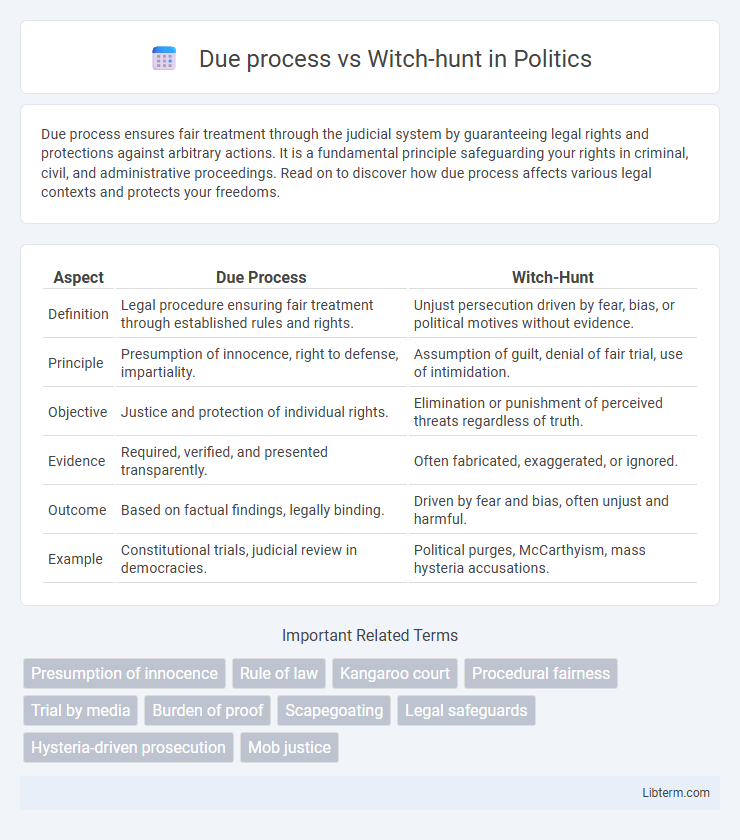Due process ensures fair treatment through the judicial system by guaranteeing legal rights and protections against arbitrary actions. It is a fundamental principle safeguarding your rights in criminal, civil, and administrative proceedings. Read on to discover how due process affects various legal contexts and protects your freedoms.
Table of Comparison
| Aspect | Due Process | Witch-Hunt |
|---|---|---|
| Definition | Legal procedure ensuring fair treatment through established rules and rights. | Unjust persecution driven by fear, bias, or political motives without evidence. |
| Principle | Presumption of innocence, right to defense, impartiality. | Assumption of guilt, denial of fair trial, use of intimidation. |
| Objective | Justice and protection of individual rights. | Elimination or punishment of perceived threats regardless of truth. |
| Evidence | Required, verified, and presented transparently. | Often fabricated, exaggerated, or ignored. |
| Outcome | Based on factual findings, legally binding. | Driven by fear and bias, often unjust and harmful. |
| Example | Constitutional trials, judicial review in democracies. | Political purges, McCarthyism, mass hysteria accusations. |
Understanding Due Process: Definition and Importance
Due process is a fundamental legal principle guaranteeing fair treatment through the judicial system, protecting individuals from arbitrary actions by the government. It ensures rights such as the presumption of innocence, the right to a fair trial, and access to legal representation. Understanding due process is crucial to uphold justice and prevent miscarriages of justice that resemble witch-hunts, where accusations are driven by hysteria rather than evidence.
What Constitutes a Witch-Hunt?
A witch-hunt constitutes an aggressive and often unjust campaign targeting individuals or groups based on fear, suspicion, or prejudice rather than evidence and fair legal procedures. Unlike due process, witch-hunts bypass established legal rights, relying on public hysteria, accusations without proof, and denial of the accused's ability to defend themselves. This results in wrongful persecution and undermines the principles of justice and impartiality.
Historical Contexts: Due Process vs Witch-Hunts
Due process, rooted in legal traditions dating back to Magna Carta in 1215, guarantees fair treatment through established judicial procedures, protecting individuals from arbitrary punishment. In contrast, witch-hunts, prevalent in Europe and Colonial America between the 15th and 18th centuries, often bypassed legal norms, resulting in biased trials, false accusations, and executions driven by mass hysteria and superstition. Understanding these historical contexts highlights the evolution of justice from chaotic persecution to structured legal safeguards.
Key Differences Between Due Process and Witch-Hunt
Due process ensures fair legal procedures and protects individual rights through impartial trials, evidence evaluation, and the presumption of innocence. Witch-hunts involve irrational, biased persecution driven by fear or prejudice, often lacking credible evidence and disregarding legal standards. Key differences include the adherence to established laws and fairness in due process versus the arbitrary, unjust accusations characteristic of witch-hunts.
Legal Protections and Safeguards
Due process ensures legal protections by guaranteeing the right to a fair trial, including impartial judges, the presumption of innocence, and the opportunity for defense. In contrast, a witch-hunt bypasses these safeguards, relying on hysteria, unverified accusations, and the absence of objective evidence. Legal systems uphold due process to protect individual rights and prevent arbitrary punishment, whereas witch-hunts undermine justice through fear-driven persecution.
Consequences of Ignoring Due Process
Ignoring due process undermines the foundation of justice, leading to wrongful convictions and the erosion of legal protections. When due process is bypassed, societies risk descending into witch-hunts characterized by fear-driven persecution and violation of individual rights. These consequences result in damaged reputations, loss of public trust in judicial systems, and long-term social instability.
Modern-Day Examples of Witch-Hunts
Modern-day witch-hunts often manifest as social media-fueled moral panics where accusations spread rapidly without evidence or fair investigation, undermining the principle of due process. Examples include public shaming campaigns targeting individuals for alleged misconduct based on unverified claims, reflecting a shift from legal protocols to mob justice. These phenomena highlight the danger of bypassing established legal safeguards in favor of instant judgment fueled by viral outrage.
The Role of Media in Due Process and Witch-Hunts
Media plays a crucial role in shaping public perceptions during both due process and witch-hunts by influencing the dissemination of information and framing narratives around suspects and legal proceedings. In cases adhering to due process, responsible journalism upholds principles of fairness, accuracy, and presumption of innocence, promoting transparency and accountability within legal systems. Conversely, during witch-hunts, sensationalized or biased media coverage exacerbates public hysteria, undermines judicial impartiality, and often leads to wrongful accusations and compromised integrity of justice.
Societal Impacts: Trust, Fear, and Justice
Due process upholds societal trust by ensuring fairness and transparency in legal proceedings, reinforcing confidence in justice systems. Witch-hunts erode this trust, fostering fear and hysteria that undermine social cohesion and promote injustice through baseless accusations. The contrast between these approaches profoundly affects public perception of legitimacy and authority within communities.
Promoting Fairness: Ensuring Due Process in All Proceedings
Due process safeguards individual rights by guaranteeing fair treatment through impartial hearings and evidence-based judgments in all legal and administrative proceedings. Witch-hunts circumvent these standards, relying on bias, fear, and unsubstantiated accusations that undermine justice and erode public trust. Promoting due process ensures transparency, accountability, and respect for the rule of law, preventing arbitrary punishments and protecting civil liberties.
Due process Infographic

 libterm.com
libterm.com